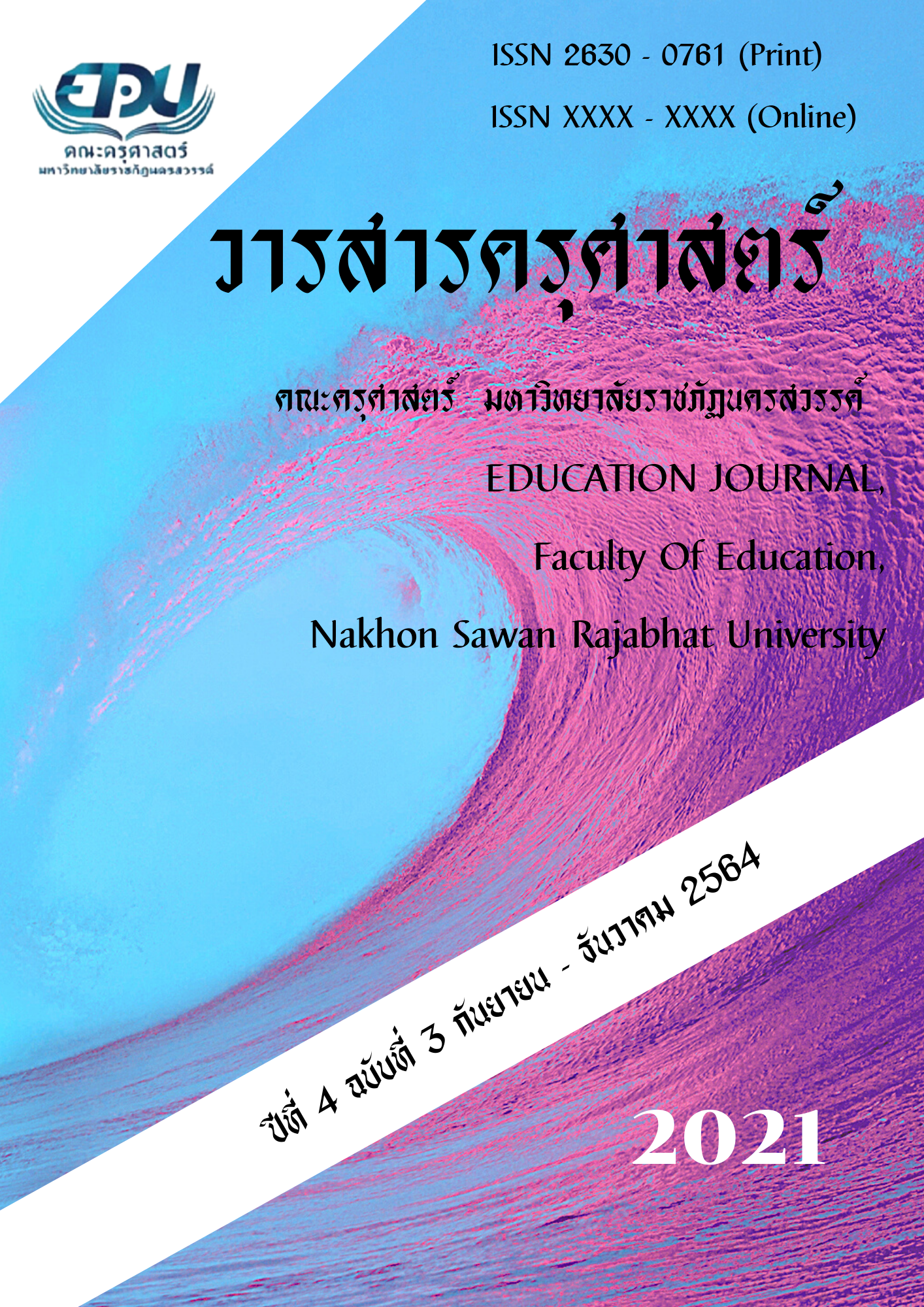The Evaluation of the project of (OBEC) Moral School for Anuban Nakhon Sawan School
Main Article Content
Abstract
The purposes of this research was to evaluate of The project of (OBEC) Moral School for Anuban Nakhon Sawan School with the following objectives: 1) to evaluate the context of the project of (OBEC) Moral School for Anuban Nakhon Sawan School, 2) to evaluate the input of the project of (OBEC) Moral School for Anuban Nakhon Sawan School, 3) to evaluate the process of The project of (OBEC) Moral School for Anuban Nakhon Sawan School, and 4) to evaluate the produce of The project of (OBEC) Moral School for Anuban Nakhon Sawan School. The samples used in the study were 94 teachers, 13 basic education committee members, 2,487 students, and 128 parents from parents network, totaling 3,182 people in specific sampling and stratified random sampling. The tools used to collect data in this evaluation was a project evaluation questionnaire with the characteristics of a rating scale of 5 levels, analyzed by means of mean, and standard deviation.
The results of this research were as follows: 1) evaluation of the context was as a high level. 2) The evaluation of the input was as a highest level. 3) The evaluation of the process was as a highest level. 4)The evaluation of the produce were 4.1) The achievement of the project found that the 4 standard were at a highest level. 4.2) the evaluation of the Behavior identified according to moral identity was at a highest level And 4.3) the evaluation of the satisfaction assessment with the operation of the project of (OBEC) Moral School for Anuban Nakhon Sawan School found that they were satisfied were at the highest level.
Suggestions for implementing the project includes 1) The administrators are the leaders in running and developing ‘A Moral School of Office of the Basic Education Commission: OBEC. 2) The administrators should clearly set up a policy of morality and ethics promotion. 3) The administrators require teachers to create a lesson plans that contain morality and ethics. 4) The administrators must act as an example of morality and ethics. 5) The administrators must provide training of morality and ethics and encourage teachers to develop themselves according to the moral identity of the school to be a good example and develop students effectively. 6) Students should be developed according to the moral identity of the school by encouraging students to take action on projects. 7) The administrators encourage students to work as a team using group processes. 8) The school should be improved and developed of the school area to be clean, cool, and pleasant to learn. 9) The administrators encourage the community to participate in school activities on appropriate occasions.
Downloads
Article Details

This work is licensed under a Creative Commons Attribution-NonCommercial-NoDerivatives 4.0 International License.
References
คุณธรรมนำความรู้สู่ความดี สังกัดสำนักงานเขตพื้นที่การศึกษาสุพรรณบุรี เขต 2.
วิทยานิพนธ์ครุศาสตรมหาบัณฑิต (บริหารการศึกษา). มหาวิทยาลัยราชภัฏกาญจนบุรี.
ฉันทนา โรจนบูรณาวงศ์ (2552). รายงานการประเมินโครงการพัฒนาคุณธรรมจริยธรรมนักเรียน
โรงเรียนบานมะกอก โดยบูรณาการกิจกรรมสงเสริมคุณธรรมรูปแบบเดิมกับแนวทางปลูกฝง
จิตสำนึกคุณธรรมของมูลนิธิพุทธฉือจี้ไตหวัน เข้าถึงได้จาก
https://www.kroobannok.com/news_file/p90689170018.pdf. 5 กุมภาพันธ์ 2562
ธีระ ขันบุตร (2562) กลยุทธ์การบริหารจัดการโรงเรียนคุณธรรมที่มีสัมฤทธิผล โรงเรียนบ้านปากน้ำ
(เผดิมจีนนาวาสงเคราะห์) อำเภอเมือง จังหวัดชุมพร. วารสารการบริหารการศึกษา มหาวิทยาลัย
ศิลปากร 10 (1) (มกราคม - มิถุนายน 2562), 955 – 966.
ประยุทธ มะลิงาม (2560). การประเมินโครงการส่งเสริมคุณธรรมจริยธรรม และค่านิยมที่พึงประสงค์ของ
นักเรียน โรงเรียนจอมพระประชาสรรค์อำเภอจอมพระ จังหวัดสุรินทร์
เข้าถึงได้จาก https://www.gotoknow.org/posts/151689. 8 มกราคม 2562
ศักดิ์อนันต์ อนันตสุข (2561). รายงานการประเมินโครงการโรงเรียนคุณธรรม โรงเรียนตาเบาวิทยา. สืบค้น
เข้าถึงได้จาก http://www.anantasook.com/moral-school-report/. 8 มกราคม 2562
สำนักพัฒนานวัตกรรมการจัดการศึกษา (2560). โรงเรียนคุณธรรม สพฐ. กรุงเทพ :สหมิตรพริ้นติ้ง
แอนด์พับลิสชิ่ง จำกัด.
อนัญญา ทาระธรรม (2561). รายงานการประเมินโครงการพัฒนาคุณธรรมจริยธรรมตามหลักปรัชญา
ของเศรษฐกิจพอเพียงของ นักเรียนโรงเรียนวัดเนินหินแร่(เหมยากรนุสรณ์)
เข้าถึงได้จาก http://www.edunayok.eduweb.in.th/gis/eoffice/57000001tbl_vichakarn/.
15 มกราคม 2562
อำนาจ ขันทกาญจน์ (2561). รายงานการประเมินโครงการพัฒนาและส่งเสริมคุณธรรมจริยธรรมของ
นักเรียนโรงเรียนบ้านคลองปะเหลียน ปีการศึกษา 2561 เข้าถึงได้จาก
http://www.kroobannok.com/board_view.php?b_id=169673&bcat_id=12. 8 มกราคม 2562
Akar Vural, R. et al. (2013). The Development of the “Sense of Belonging to School” Scale.
Eurasian Journal of Educational Research, 53(Fall), 215- 230.
Stufflebeam, D. L., & Webster, W. J. (1983). An analysis of alternative approaches
to evaluation. In Madaus, G. F., Scriven, M. S. & Stufflebeam, D. L.
(Eds.), Evaluation models: viewpoints on educational and human


